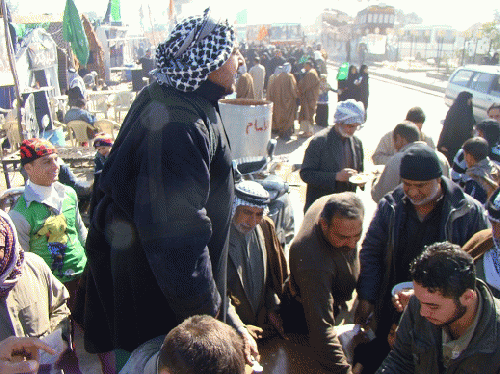internet and electricity isn't so reliable.
Sincerely,
Kathy
October 26, 2012
Najaf,
Iraq -- "Come to eat" the man cries out. "Come!" he calls
invitingly. And they do. In the thousands, in the millions. They
come streaming into Karbala from all directions to the sacred shrine
of their holy martyrs, Imam Hussein and Abbas.
I have just returned to Najaf after spending some days in Karbala visiting a good friend of ours there and getting to know his dear family. In both my going from and my returning to Najaf, I was moved by the sight of pilgrims walking on the side of the road to Karbala.
These holy commemorations and pilgrimages were not allowed under Saddam. The regime collapsed on April 9, 2003. Less than two weeks later, on the 20th of April was the 40th commemoration of the death of Imam Hussein. Approximately four million pilgrims travelled to Karbala that year. I was in Baghdad at that time and remember young Shia friends telling us with deep emotion and excitement about taking part in a similar pilgrimage, a treasured tradition so long denied them. One can imagine how disconcerting and foreign such a phenomena was to the U.S. troops who were occupying Karbala and the surrounding country. "How can we control such numbers?" they asked. My host was one of the persons who told them, "Just stay on your bases." Fortunately they listened , and only patrolled overhead with helicopters. Now Karbala receives between 12 and 14 million during the feast that remembers the death of Imam Hussein.
Everyone in Karbala opens their houses to these travelers. Food is cooked, tents are set up, first-aid stations readied, washing machines brought outside for pilgrims to use. Things like socks and T-shirts are purchased as are lentils, fruit and rice. Sheep are slaughtered. Even massages are given to the aching and weary. Somehow it all works.
During my stay people came to visit the house of my host. "Things are bad here " they said. " How are things in America? Can we go to live there?" I spoke of the faltering economy and lack of jobs in the U.S., of how Iraqi refugees we know are struggling to find work to pay their rent. I was able to hear from young Iraqis, something I particularly welcomed. I was profoundly saddened however by the depth of their resignation. One high school teacher from an outlying area said "The war has turned humans into beasts. The students are angry, violent and aggressive"they no longer have principles or respect."
A third year university student told me, "The war is not over. The war continues. Everyone has hope for the future, but we do not have hope. We are frightened about the unstable situation, what will happen? Most of the terrorists come from outside. The government and politicians offer only empty promises. We are entering the tenth year. What has changed?"
I hesitate to write too much so soon into my trip, but the message I keep hearing seems unmistakable. There is political corruption in the whole country, with people filling their pockets and looking out for their own interests. Again and again I have heard: We see no hope for Iraq.
Ten years and what hasn't changed? There is still no functioning national electrical system. I have not yet found potable drinking water. There is still just one radiation center in Baghdad with a waiting list of 6 months despite a marked increase in cancer cases. What hasn't changed is the goodness I find, the warm hospitality and welcome. The same young man who said he sees no hope for Iraq told me: "If you want to be good you can be. It is easy to be bad. If you are good, the world respects you."
Cathy Breen ( Email address removed ) co-coordinates Voices for Creative Nonviolence. (vcnv.org) She will be writing about her visits to several communities in Iraq during the next several weeks.






